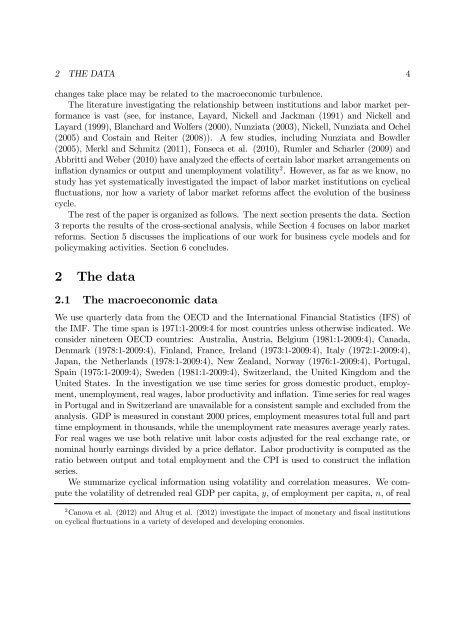Do labor market institutions matter for business cycles?∗ - European ...
Do labor market institutions matter for business cycles?∗ - European ...
Do labor market institutions matter for business cycles?∗ - European ...
Create successful ePaper yourself
Turn your PDF publications into a flip-book with our unique Google optimized e-Paper software.
2 THE DATA 4<br />
changes take place may be related to the macroeconomic turbulence.<br />
The literature investigating the relationship between <strong>institutions</strong> and <strong>labor</strong> <strong>market</strong> per<strong>for</strong>mance<br />
is vast (see, <strong>for</strong> instance, Layard, Nickell and Jackman (1991) and Nickell and<br />
Layard (1999), Blanchard and Wolfers (2000), Nunziata (2003), Nickell, Nunziata and Ochel<br />
(2005) and Costain and Reiter (2008)). A few studies, including Nunziata and Bowdler<br />
(2005), Merkl and Schmitz (2011), Fonseca et al. (2010), Rumler and Scharler (2009) and<br />
Abbritti and Weber (2010) have analyzed the effects of certain <strong>labor</strong> <strong>market</strong> arrangements on<br />
inflation dynamics or output and unemployment volatility 2 . However, as far as we know, no<br />
study has yet systematically investigated the impact of <strong>labor</strong> <strong>market</strong> <strong>institutions</strong> on cyclical<br />
fluctuations, nor how a variety of <strong>labor</strong> <strong>market</strong> re<strong>for</strong>ms affect the evolution of the <strong>business</strong><br />
cycle.<br />
The rest of the paper is organized as follows. The next section presents the data. Section<br />
3 reports the results of the cross-sectional analysis, while Section 4 focuses on <strong>labor</strong> <strong>market</strong><br />
re<strong>for</strong>ms. Section 5 discusses the implications of our work <strong>for</strong> <strong>business</strong> cycle models and <strong>for</strong><br />
policymaking activities. Section 6 concludes.<br />
2 The data<br />
2.1 The macroeconomic data<br />
We use quarterly data from the OECD and the International Financial Statistics (IFS) of<br />
the IMF. The time span is 1971:1-2009:4 <strong>for</strong> most countries unless otherwise indicated. We<br />
consider nineteen OECD countries: Australia, Austria, Belgium (1981:1-2009:4), Canada,<br />
Denmark (1978:1-2009:4), Finland, France, Ireland (1973:1-2009:4), Italy (1972:1-2009:4),<br />
Japan, the Netherlands (1978:1-2009:4), New Zealand, Norway (1976:1-2009:4), Portugal,<br />
Spain (1975:1-2009:4), Sweden (1981:1-2009:4), Switzerland, the United Kingdom and the<br />
United States. In the investigation we use time series <strong>for</strong> gross domestic product, employment,<br />
unemployment, real wages, <strong>labor</strong> productivity and inflation. Time series <strong>for</strong> real wages<br />
in Portugal and in Switzerland are unavailable <strong>for</strong> a consistent sample and excluded from the<br />
analysis. GDP is measured in constant 2000 prices, employment measures total full and part<br />
time employment in thousands, while the unemployment rate measures average yearly rates.<br />
For real wages we use both relative unit <strong>labor</strong> costs adjusted <strong>for</strong> the real exchange rate, or<br />
nominal hourly earnings divided by a price deflator. Labor productivity is computed as the<br />
ratio between output and total employment and the CPI is used to construct the inflation<br />
series.<br />
We summarize cyclical in<strong>for</strong>mation using volatility and correlation measures. We compute<br />
the volatility of detrended real GDP per capita, y, of employment per capita, n, of real<br />
2 Canova et al. (2012) and Altug et al. (2012) investigate the impact of monetary and fiscal <strong>institutions</strong><br />
on cyclical fluctuations in a variety of developed and developing economies.
















